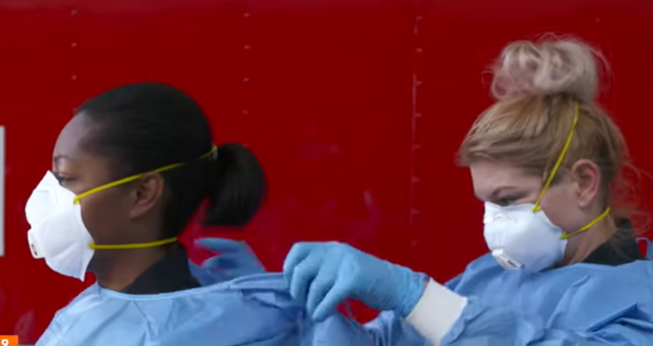
Research shows that coronavirus can also be spread by talking and breathing. This new information was shared by a prestigious scientific panel during a White House briefing on April 1.
According to a letter written by Dr. Harvey Fineberg, chairman of a committee with the National Academy of Sciences, that although the current coronavirus specific research is limited, the results of the available studies consist of aerosolization of virus from normal breathing.
Coronavirus spread through talking and breathing
Because of this discovery, Fineberg stated that he will start wearing a mask when he goes to the grocery store. He said that he is not going to wear a surgical mask, because of the shortage, but he will use a bandana as a substitute. He also encourages the public to do the same, to help prevent getting infected.
The key member of the White House coronavirus task force, Dr. Anthony Fauci, stated that the idea of recommending broad use of masks in the US to prevent the spread of coronavirus is under discussion by the group. Fineberg said that his letter was sent on April 1 in response to a query from Kelvin Droegemeier with the Office of Science and Technology Policy at the White House.
The letter states: "This letter responds to your question concerning the possibility that [coronavirus] could be spread by conversation, in addition to sneeze/cough-induced droplets. "Currently available research supports the possibility that [coronavirus] could be spread via bioaerosols generated directly by patients' exhalation."
How the virus spreads
According to the US Centers for Disease Control and Prevention or CDC, the virus spreads from person to person when people are within 6 feet of each other, and it is through the respiratory droplets produced when an infected person sneezes or coughs.
Fineberg added that the research shows that aerosolized droplets that are produced by talking or even by breathing can also spread the virus, which is why social distancing is very important. His letter also explains that research at a hospital in China shows that the virus can be suspended in the air when nurses and doctors remove their protective gear, or when floors are disinfected and cleaned or when staff move around the establishments.
A research done by the University of Nebraska shows that genetic material from the virus was found in the rooms more than 6 feet away from the patients. Fineberg said that it is possible that aerosolized coronavirus droplets can hang in the air and potentially infect someone who walks by the infected area.
Fineberg added that coronavirus is not as infectious as tuberculosis and measles. The length of time that the virus lingers in the air entirely depends on several factors, including how much virus an infected person puts out when talking or breathing, and also on the amount of circulation in the air.
Fineberg stated that if an aerosol of the virus is generated without any circulation in a room, it is conceivable that if you walk through the room later, you could inhale the virus and you can be potentially infected. However, if you are outside, the breeze will disperse it.
Currently, the total coronavirus cases worldwide are at 1,201,964, with 64,727 deaths and 246,638 recovered cases.
Related Article: Should You Disinfect Your Groceries? Experts Warn Against Dangers of Washing Produce
© 2025 HNGN, All rights reserved. Do not reproduce without permission.








